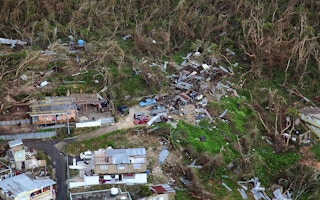When it comes to climate change, 2017 was, unfortunately, more of the same frightening news: temperature records sent topping once again, natural disasters that left thousands devastated in the Northern Hemisphere’s hurricane season, and new peaks for global greenhouse gas emissions.
But hope came in the form of some countries moving to pass laws that put a price on carbon, and the huge resistance mounted by companies, cities, and community groups to United States President Donald Trump’s decision to pull the US out of the Paris Agreement on climate change.
Hope and heartbreak alike, here are the top five carbon and climate stories from this year.
1. Trump pulls out of Paris
In June this year, Donald Trump announced that he would pull the United States—the world’s largest emitter of greenhouse gas emissions—out of the Paris Agreement on climate change as soon as it is eligible to do so. The decision was formally announced to the United Nations in August.
The announcement sparked shock and alarm around the world, with climate scientists, politicians, and activists alike issuing strongly-worded rebukes. It also galvanised American companies and cities, as well as international governments to pick up the slack. For instance, US cities, companies, investors, and universities launched the ‘We Are Still In’ coalition to reaffirm their commitment to climate action.
The cheekiest international response came from French president Emmanuel Macron, who vowed to ‘Make the planet great again’—a play on Trump’s election tagline—as he urged foreign climate scientists to come to France to conduct research.
2. It’s (still) getting hot in here
Bad news: 2017 is officially the hottest non-El Nino year ever. While the record temperatures of 2015 and 2016 were explained by the weather phenomenon which brings hot and dry weather to affected areas, this year’s results show that temperatures are increasing independent of El Nino. The peak in temperatures also coincided with an all-time spike in atmospheric concentrations of carbon dioxide in excess of 410 parts per million.
Soaring global temperatures had a visible impact this year when a trillion-tonne iceberg broke off Antarctica’s Larsen C ice shelf in July. Scientists have since detected instability in another ice sheet in east Antarctica that holds enough water to raise sea levels by 53 metres worldwide.
3. Deadly disasters
The Atlantic Hurricane Season was the most expensive in US history, and the devastation prompted experts to warn, once again, of the inescapable link between climate change and increasingly intense hurricanes.
Hurricanes Harvey and Irma killed dozens and caused billions of dollars in damages when they swept through the Caribbean and United States, but perhaps most devastating of all was Hurricane Maria, the strongest to hit Puerto Rico in 85 years. Media outlets estimate that between 500, and 1,000 lives were lost as a result of the storm, which also destroyed electricity, water, and road infrastructure on the island; much of this damage has yet to be repaired.
While Asia had a much quieter Pacific Typhoon Season, it still sustained significant damage from Typhoon Hato in mid-August.
4. Spike in funding for climate action
Governments, financiers and companies alike this year pledged billions of dollars to help countries mitigate, and adapt to, climate change this year. The World Bank recently announced a US$4.5 billion scheme for the developing world, the European Commission has just pledged €9 billion in funding, and the UN’s Adaptation Fund received a US$93 million cash injection at the Bonn climate talks this year, exceeding its US$80 million annual goal. Private banks also got in on the act: HSBC committed US$100 billion in sustainable financing by 2025, while JP Morgan has committed twice that amount to clean energy financing.
However, observers have noted at the Bonn climate talks that developed countries are failing to meet the US$100 billion funding commitment they have made to the UN Green Climate Fund, or one-third of the US$300 billion a year that will be needed to cope with climate losses by 2030.
5. Cutting the carb—a little
Offering a sliver of optimism, countries around the world announced new measures that will force polluters to pay for the emissions they release.
China in late December introduced the world’s largest carbon trading scheme, which observers have dubbed a “game changer” and a mark of global leadership by China. The scheme will focus on the country’s 1,700 fossil fuel plants that collectively account for about 3 billion tonnes of carbon dioxide emissions annually.
Singapore in February became the first Southeast Asian nation to indicate it will implement a carbon pricing scheme, scheduled for 2019. In May, Bangladesh announced plans for a carbon tax on fuel but soon backtracked because officials were reluctant to increase the cost of living in the country ahead of an election year.
In Australia, Malcolm Turnbull’s Coalition government rejected a recommendation from the country’s chief scientist Alan Finkel to adopt a national Clean Energy Target, which would force electricity companies to provide a fixed proportion of their power from low-emissions sources such as renewable energy—to strong criticism.
This story is part of our Year in Review series, which looks at the top stories that shaped the business and sustainability scene over the last 12 months.





















